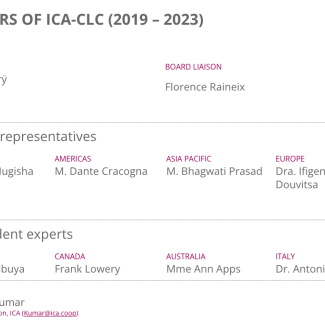Disclaimer* The images, art and literary works and related material contained in this website are intended solely for educational, news and other forms of fair use. The owners of this website are strictly and absolutely a non-profit organisation and do not intend to derive any direct or indirect commercial benefit from the use of the art and literary works, nor do they claim any ownership of the same.
Introduction
ICA-CLC is a thematic committee constituted by the General Assembly, with the objective of giving independent advice to the ICA on cooperative law.
Cooperative law is broadly defined to include all legal Rules that shape the cooperative institution and regulate its operations.
The committee is composed of legal experts from multiple jurisdictions who are well versed with cooperatives. These experts are recommended and appointed by the four regions of the ICA and the ICA Board. The current ICA-CLC will be constituted for its four-year term on 13 October 2019, during the ICA Global Conference on Cooperatives for Development and General Assembly in Kigali (Rwanda). ICA-CLC is primarily guided by its Rules, and other ICA instruments such as By laws, General Assembly resolutions and ICA Board mandates.
Why promote cooperative law?
Cooperatives, just like other enterprises, usually operate within legal and regulatory frameworks or norms. It is important that these frameworks recognize the unique character of cooperatives as people-centered, inclusive and democratic enterprises, and aid their development & growth.
In other words, legislation and regulation on cooperatives must uphold the basic yet universal cooperative identity. Many a time, legal & regulatory frameworks have proven to hinder the same. This can be due to lack of awareness on the true value, potential and global outreach of cooperatives as such, or worse - apathy towards the development & growth of cooperatives. Either way, an insufficient legislation on cooperatives, or even the over-regulation of cooperatives and their members’ activities often result in imbalanced and non-representative organizations.
Therefore, it is imperative for the ICA, as the global custodian of the cooperative identity, to promote an environment that supports the creation and implementation of legislation that reflects the universally adopted definition, values and the seven principles of cooperatives, that together form the ICA Statement on the Cooperative Identity as adopted by the members of the ICA during the centennial ICA congress in 1995 in Manchester (U.K.).
Main areas of activity
- Working with the ICA Board’s Identity Committee, develop proposals for contemporary legal interpretation of the definition of cooperatives and of the cooperative values and principles and the translation of these into legal principles.
- Develop proposals to translate the legal principles into cooperative law, securing the cooperative identity.
- Elaborate, where warranted, suggestions for the harmonisation of cooperative laws.
- Assess, advise on, propose and monitor changes in cooperative policy at national regional, international and global level as they affect cooperative law.
- Participate in the establishment of implementation mechanisms, such as cooperative registration, monitoring and auditing.
- Promote the elaboration of such resources as law commentaries, glossaries, handbooks on drafting bylaws and model bylaws, proposals for government regulation and research on and teaching of cooperative law.
- Liaise and coordinate with the other thematic committees, sectoral organisations, regional organisations and any organs of the ICA as appropriate.
- Consider specific legal issues that are referred to it from other thematic committees, sectoral organisations, regional organisations and any organs of the ICA through its Global Board
- Set up Ad-hoc committees to deal with specific issues when it sees fit.
Membership and rules
The Cooperative Law Committee is composed of a Chairperson appointed by the ICA Board, four representatives of the ICA regions, four independent experts one from each ICA region, and an ICA Board member to ensure liaison between CLC and the Board.
Please follow the link to view the CLC rules.
